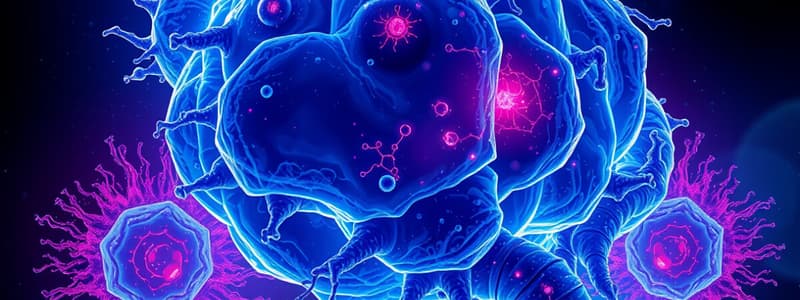Podcast
Questions and Answers
What is a primary cause of pathological hyperplasia?
What is a primary cause of pathological hyperplasia?
- Genetic mutations in cell structure
- Infections affecting cell function
- Inadequate hormone levels
- Excesses of hormones or growth factors (correct)
What occurs during atrophy?
What occurs during atrophy?
- Decrease in cell size and number (correct)
- Increase in cell size and function
- Transformation of cells into a different type
- Formation of new cells and tissues
Which of the following best describes endometrial hyperplasia?
Which of the following best describes endometrial hyperplasia?
- Complete absence of endometrial tissues
- Abnormal increase of endometrial cells (correct)
- Normal cell growth in the endometrium
- Decrease in endometrial cell function
What primarily triggers the process of pathological hyperplasia?
What primarily triggers the process of pathological hyperplasia?
What is NOT a characteristic of atrophy?
What is NOT a characteristic of atrophy?
Flashcards are hidden until you start studying
Study Notes
Pathological Hyperplasia
- Characterized by excessive cell proliferation due to hormonal or growth factor stimulation.
- Endometrial hyperplasia serves as a notable example of abnormal hormone-induced hyperplasia.
Atrophy
- Involves a reduction in cell size and number, resulting in a diminished organ or tissue size.
- Associated with physiological changes or responses to various stresses.
Physiological Atrophy
- Can occur in specific structures, such as the thyroglossal duct, demonstrating the body's adaptability to changing demands.
- Genetic disorders like Down syndrome and sickle cell anemia can contribute to cellular atrophy.
Nutritional Imbalances
- Range from conditions like marasmus (severe malnutrition) to obesity, affecting overall health and cellular function.
- Associated with atherosclerosis due to the impact of poor dietary intake on vascular health.
Hydropic Change
- Involves cellular swelling; often linked with the alteration of normal cellular structures.
- Describes changes occurring under pathological conditions, leading to functional impairment within tissues.
Studying That Suits You
Use AI to generate personalized quizzes and flashcards to suit your learning preferences.




